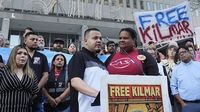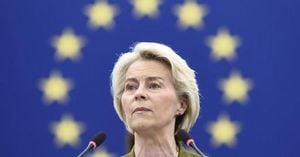On a hot August morning in Baltimore, the saga of Kilmar Abrego Garcia—a Salvadoran national, construction worker, and father—reached a boiling point as he surrendered to U.S. Immigration and Customs Enforcement (ICE). Surrounded by supporters and with his wife, Jennifer Vasquez Sura, by his side, Abrego Garcia walked into the downtown ICE office on August 25, 2025, knowing full well that he was about to be detained and processed for deportation. The drama surrounding his case has become a flashpoint in the ongoing debate over the Trump administration’s immigration policies, the use of obscure legal tools, and the question of where, exactly, America should send those it expels.
According to The Associated Press, Abrego Garcia’s arrest comes after a whirlwind year. Earlier in 2025, he was deported to his native El Salvador, a move later deemed wrongful by a federal judge due to his “well-founded fear” of violence there. By June, he was back in the U.S.—but not as a free man. Instead, he faced human smuggling charges stemming from a 2022 traffic stop in Tennessee, when police found nine passengers in his car but ultimately let him go with only a warning. The Trump administration, however, was not finished with him. Citing the 18th-century Alien Enemies Act, officials deported Abrego Garcia and 260 others in a rapid sweep earlier this year, only to bring him back after an administrative error and a court order.
Now, the administration is pushing to deport Abrego Garcia again, but with a twist: not to El Salvador, where he fears persecution, but to Uganda—a country thousands of miles away, with which he has no known ties. Immigration officials have said that Uganda recently agreed to accept certain deportees from the U.S., provided they have no criminal records and are not unaccompanied minors. According to filings in federal court cited by AP, the Costa Rican government has also expressed willingness to accept Abrego Garcia as a legal immigrant, but only if he pleads guilty to human smuggling charges. He refused the deal, instead maintaining his innocence and denying any ties to the notorious MS-13 gang.
“It is preposterous that they would send him to Africa, to a country where he doesn’t even speak the language, a country with documented human rights violations, when there are so many other options,” his attorney, Simon Sandoval-Moshenberg, told reporters outside the ICE field office, as reported by The New York Post and Fox News. Sandoval-Moshenberg pledged to “fight tooth and nail against any form of deportation to Uganda or nearby countries.”
Yet, as several outlets have pointed out, Uganda’s official language is English—a fact that complicates the lawyer’s argument. Critics, including commentators on social media and in conservative outlets, have noted the irony: “The official language of Uganda is English—which he also didn’t speak when he snuck into America,” one post read. Still, Sandoval-Moshenberg and supporters argue that language is only one of many concerns, pointing to Uganda’s documented human rights issues and the sheer distance from Abrego Garcia’s family.
Department of Homeland Security Secretary Kristi Noem was unequivocal in her stance. “Today, ICE law enforcement arrested Kilmar Abrego Garcia and are processing him for deportation,” she announced on social media. “President Trump is not going to allow this illegal alien, who is an MS-13 gang member, human trafficker, serial domestic abuser, and child predator to terrorize American citizens any longer.” The administration has insisted that Abrego Garcia is a danger to the community, citing a 2019 police report from the Prince Georges County Police Gang Unit that validated him as a member of MS-13 and found him in possession of cash, drugs, and in the company of other alleged gang members. Abrego Garcia and his lawyers have consistently denied these allegations, calling them vindictive and unfounded.
Abrego Garcia’s legal odyssey has been marked by a series of court orders and legal maneuvers. Judge Paula Xinis, appointed by President Obama, ordered his release from a Tennessee jail on August 22, 2025, and temporarily blocked ICE from apprehending him as he traveled to Maryland. She later told Trump administration officials they were “absolutely forbidden” from removing Abrego Garcia until she could hold a hearing to determine whether he would be given the opportunity to contest his deportation. A blanket court order in Maryland also automatically pauses any effort by the administration to deport detainees who file a habeas corpus petition, blocking removal until 4 p.m. on the second business day after the petition is filed. In Abrego Garcia’s case, his attorneys moved quickly, filing a lawsuit in federal district court shortly after his detention and requesting an interim order to halt his deportation until he could contest it.
Meanwhile, the administration’s tactics have drawn criticism from both sides of the political aisle. Democratic lawmakers, including Maryland’s Senator Chris Van Hollen, initially rallied to Abrego Garcia’s defense after his wrongful deportation in March, even traveling to El Salvador to advocate for his return. However, their public support faded as allegations of gang membership and domestic abuse surfaced. Sandoval-Moshenberg, for his part, accused ICE of “weaponizing the immigration system in a way that’s completely unconstitutional.” He characterized the administration’s offer—deportation to Costa Rica if Abrego Garcia pleads guilty, or Uganda if he refuses—as “holding Costa Rica as a carrot and using Uganda as a stick.”
For Abrego Garcia and his family, the uncertainty is agonizing. Video released by his advocates showed an emotional reunion with his children and wife after his release from jail, the room adorned with streamers and signs. Yet, just days later, he was once again in ICE custody, facing the very real prospect of being sent halfway around the world. His wife, who has previously accused him of abuse but now publicly advocates for his innocence, was seen comforting him as he was taken away.
The broader implications of Abrego Garcia’s case are hard to ignore. The Trump administration’s use of the Alien Enemies Act, its willingness to deport individuals to third countries, and its insistence on rapid removals have all come under scrutiny. Supporters of the administration argue that such measures are necessary to protect the public and enforce immigration laws. Critics counter that due process and human rights are being trampled in the rush to deport, and that the choice of Uganda as a destination is especially punitive.
As of now, Abrego Garcia remains in legal limbo. Thanks to the court orders, he cannot be deported until at least August 27, 2025, pending further hearings. Whether he will ultimately be sent to Uganda, Costa Rica, or somewhere else remains to be seen. What is clear is that his case has become a litmus test for the nation’s immigration system—raising thorny questions about justice, family, and the limits of executive power in an era of fierce political division.




